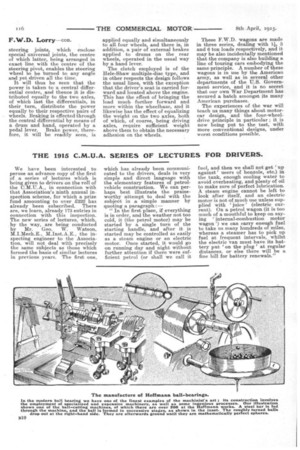THE 1915 C.M.U.A. SERIES OF LECTURES FOR DRIVERS.
Page 16

If you've noticed an error in this article please click here to report it so we can fix it.
We have been interested to peruse an advance copy of the first of a series of lectures which is being given to drivers on the Toll of the C.M.U.A., in connection with that Association's ninth annual inspection scheme, for which a prize fund amounting to over 232 has already been subscribed. There are, we learn, already 173 entries in connection with this inspection. The new series of lectures, which,
• by the way, are being conducted by Mr. Geo. W. Watson, M.I.Mech.E., M.Inst.A.E., the inspecting engineer to the Association, will not deal with precisely the same subjects as those which formed the basis of similar lectures in previous years. The first one, which has already been communicated to the drivers, deals in very simple and direct language with the elementary features of petrolvehicle construction. We can perhaps best illustrate the praiseworthy attempt to dead with the subject in a simple manner by quoting a paragraph :— "In the first place, if everything is in order, and the weather not too cold, it (the petrol motor) may be started by a single turn of the starting handle, and after it is started may be controlled as easily as a steam engine or an electric motor. Once started, it would go on running day and night without further attention if there were .sufficient petrol (or shall we call it fuel, and then we shall not get 'up against' users of benzole, etc.) in the tank, enough cooling water to avoid overheating, and plenty of oil to make sure of perfect lubrication. A steam engine cannot be left to look after itself, and an electric motor is not of much use unless supplied with 'juice' (electric current). On a petrol wagon (it is too much of a, mouthful to keep on saying internal-combustion motor wagon ') we can carry enough fuel to take us many hundreds of miles, whereas a steamer has to pick up fuel at frequent intervals,whilst the electric van must have its battery put 'on the plug' at regular distances, or else there will be a fine bill for battery renewals."




















